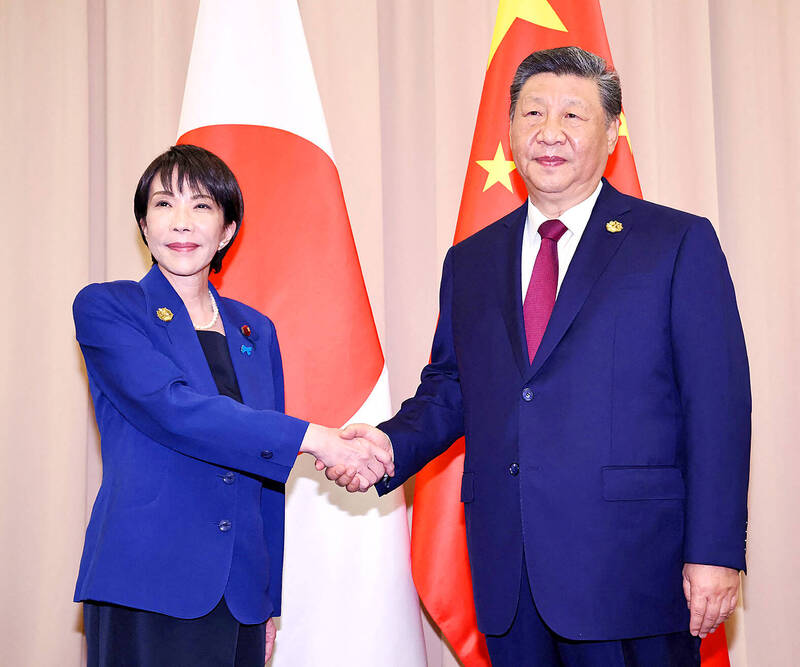Politics
Takaichi Addresses South China Sea Concerns in Xi Meeting

Japanese Prime Minister Sanae Takaichi raised significant concerns about the South China Sea, Hong Kong, and Xinjiang during her initial meeting with Chinese President Xi Jinping at the APEC summit in Gyeongju, South Korea. Takaichi, known for her hawkish stance on China, emphasized the importance of a “strategic and mutually beneficial relationship” while also addressing contentious issues affecting regional stability.
In her discussions with Xi, Takaichi stated, “We expressed serious concerns regarding actions in the South China Sea, as well as the situations in Hong Kong and the Xinjiang Uighur Autonomous Region.” Beijing has consistently denied allegations of human rights abuses in Xinjiang, asserting that its policies have effectively eradicated extremism and fostered development. Furthermore, China maintains broad claims over the South China Sea, despite a 2016 international ruling stating that these claims lack legal foundation.
Takaichi also highlighted the ongoing tensions surrounding the Japanese-administered Senkaku Islands, known as Diaoyutais in China, where confrontations between Japanese and Chinese vessels occur regularly. She raised concerns about export controls on essential materials, including rare earth elements, which are crucial for various industries. Additionally, she advocated for the immediate release of Japanese citizens detained in China and emphasized the need for safeguarding the well-being of Japanese expatriates in the country.
The Prime Minister reaffirmed her support for Taiwan, indicating that she engaged in discussions with the Chinese side on the matter. “I stated that for the stability and security in this region, maintaining good cross-strait relations is important,” she remarked.
In a related development, Canada and China have initiated steps to restore their previously strained relations. During the APEC summit, Xi met with Canadian Prime Minister Mark Carney to discuss improving bilateral ties. Following their meeting, both leaders expressed optimism about turning a new page in their relationship. A Canadian statement noted that the meeting marked a potential turning point, with Xi indicating that relations are showing signs of recovery due to collaborative efforts.
Trade tensions have previously strained Canada-China relations, particularly after Canada imposed a 100 percent tariff on Chinese electric vehicles and a 25 percent tariff on steel and aluminum. In response, China has proposed lifting import taxes on select Canadian products if Canada rescinds its electric vehicle tariffs. Both leaders instructed their officials to expedite the resolution of trade disputes and discussed specific products, including electric vehicles, canola, and seafood.
Xi emphasized the need for expanding “pragmatic” cooperation in areas such as the economy, trade, and energy, signaling a commitment to enhance bilateral relations moving forward. The outcomes of these high-profile meetings at the APEC summit indicate a critical moment for diplomatic efforts in East Asia, with implications for regional stability and international trade.
-

 Business5 months ago
Business5 months agoKenvue Dismisses CEO Thibaut Mongon as Strategic Review Advances
-

 Lifestyle5 months ago
Lifestyle5 months agoHumanism Camp Engages 250 Youths in Summer Fest 2025
-

 Sports5 months ago
Sports5 months agoDe Minaur Triumphs at Washington Open After Thrilling Comeback
-

 Sports5 months ago
Sports5 months agoTupou and Daugunu Join First Nations Squad for Lions Clash
-

 Top Stories5 months ago
Top Stories5 months agoColombian Senator Miguel Uribe Shows Signs of Recovery After Attack
-

 Health5 months ago
Health5 months agoNew Study Challenges Assumptions About Aging and Inflammation
-

 World5 months ago
World5 months agoASEAN Gears Up for Historic Joint Meeting of Foreign and Economic Ministers
-

 World3 months ago
World3 months agoSouth Korea’s Foreign Minister Cho Hyun to Visit China This Week
-

 Business5 months ago
Business5 months agoOil Prices Surge Following New EU Sanctions on Russia
-

 Entertainment5 months ago
Entertainment5 months agoDetaşe-Sabah Violin Ensemble Captivates at Gabala Music Festival
-

 Business3 months ago
Business3 months agoStarling Bank Plans Secondary Share Sale, Targeting $5.4 Billion Valuation
-

 Entertainment5 months ago
Entertainment5 months agoBaku Metro Extends Hours for Justin Timberlake Concert









